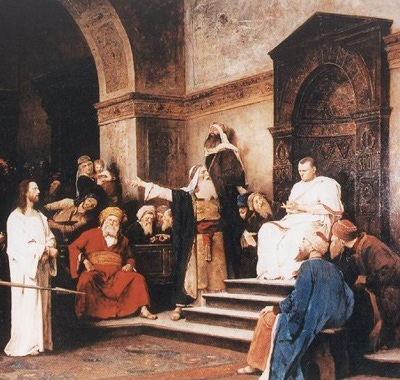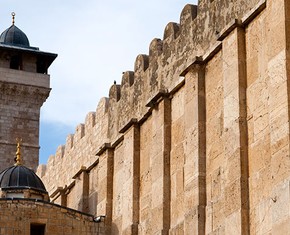The views expressed in our content reflect individual perspectives and do not represent the authoritative views of the Baha'i Faith.
According to Biblical prophecy a terrible period of turmoil — the tribulation — will take place at the time of the end, culminating in the Battle of Armageddon, when the forces of Satan wage battle with the forces of Christ and are defeated. How, though, has this tribulation, this battle, this time of trials, taken place? Does it also represent a spiritual condition of some kind?
Baha’u’llah explains that the tribulation represents the spiritual confusion that takes place in the world when those who seek spiritual truth do not know where to turn to find it:
What “oppression” [tribulation] is more grievous than that a soul seeking the truth, and wishing to attain unto the knowledge of God, should know not where to go for it and from whom to seek it? – The Book of Certitude, p. 31.
From the Baha’i perspective, tribulation occurs whenever religious leaders oppose God’s newest Revelation. For example, the Jewish clergy created tribulation, or spiritual confusion, when they tried to convince the Jews that Christ was an imposter, resulting in their rejection of Christ. Similarly, if Christian clerics cause their flocks to turn away from Baha’u’llah, then they are responsible for tribulation in this day.
In other words, the tribulation takes place when clergy mistake their own interpretation of scripture as authoritative, even when it clearly states that only God’s Prophets possess authoritative interpretation:
We have also a more sure word of prophecy … that no prophecy of the scripture is of any private interpretation. For the prophecy came not in old time by the will of man: but holy men of God spake as they were moved by the Holy Ghost. – 2 Peter 1:19-21
Consequently, Baha’u’llah explains the underlying meaning of Scriptural passages because He is God’s Prophet for this day. And as God’s Prophet, He has interpreted the events of the tribulation and the battle of Armageddon in spiritual rather than physical terms.
For instance, the disease, warfare, and famine depicted in the Book of Revelation represent and reflect the spiritual condition of humanity. In particular, the state of famine results from humanity’s search for, yet failure to find, God’s spiritual food for today — God’s Word, as revealed by Baha’u’llah. In the Bible, the prophet Amos gives a very similar description of famine on behalf of God:
Behold, the days come, saith the Lord God, that I will send a famine in the land, not a famine of bread, nor a thirst for water, but of hearing the words of the Lord. – Amos 8:11
In a similar vein, we can understand the Battle of Armageddon as a spiritual battle over the truth of Baha’u’llah’s claim to be the return of the Spirit of Christ. With such an understanding, one sees that those who accept and follow Baha’u’llah’s teachings uphold the Word of God, just as early Christians upheld the teachings of Christ to a disbelieving world.
 Baha’u’llah explains the tribulation that occurs at the end of the age occurs in every age, when a new Divine Teacher comes to reveal the Word of God to humanity. This tribulation was depicted very clearly by Christ in the “Parable of the Vineyard.” The bracketed words explain the underlying meaning of the passage.
Baha’u’llah explains the tribulation that occurs at the end of the age occurs in every age, when a new Divine Teacher comes to reveal the Word of God to humanity. This tribulation was depicted very clearly by Christ in the “Parable of the Vineyard.” The bracketed words explain the underlying meaning of the passage.
A certain man [God] planted a vineyard [humanity], and let it forth to husbandmen [religious leaders], and went into a far country for a long time. And at the season he sent a servant [Prophet] to the husbandmen, that they should give him of the fruit of the vineyard [the hearts of people]: but the husbandmen beat [persecuted] him, and sent him away empty. And again he sent another servant: and they beat him also … And again he sent a third: and they wounded him …Then said the lord of the vineyard … I will send my beloved son [Jesus Christ] … But when the husbandmen saw him, they reasoned … let us kill him, that the inheritance [the hearts of the people] may be ours … What therefore shall the lord of the vineyard [God] do unto them? He shall come [Baha’u’llah] and destroy these husbandmen, and shall give the vineyard to others. … And the chief priests [the husbandmen – religious leaders] … feared the people: for they perceived that he had spoken this parable against them. – Luke 20:19
These “chief priests”, the clergy whose power and pride prevented them from seeing the new Messenger, perceived that Christ had spoken this parable against them – and they crucified Him for it. Similarly, Baha’u’llah wrote that the clergy who oppose the new Divine Teacher are like the stars that fall from heaven. When the Divine Teacher appears amongst humanity, there is no longer any need for the clergy’s guidance, since the people now can guide their lives by the light of the sun, the Divine Teacher.
You May Also Like
Comments

















POLEMOS is defined as "from pelomai (to bustle); warfare (literally or figuratively; a single encounter or a series):--battle, fight, war".
POLEMOS also originates from the root word POLEMIC.
A POLEMIC is a discussion, a debate or a dialogue. Could it be that the "battle" is actually a dialogue or a debate about the Prophet who is exiled from the Euphrates, to the Seat of the Beast (Istanbul), to the Armageddon?
The Hebrew prefix HAR means mountain. ...The suffix MAGEDDON refers to the ancient city of Megiddo. The mountain ridge located next to the city of Megiddo in Israel is Mt Carmel.
Isaiah says that the Glory of God will come to the plain of Sharon, the city of Akka and Mt Carmel (the HarMageddon).
Baha'u'llah was exiled involuntarily as a prisoner to Aka & Mt Carmel. He fits the profile of the One who was foretold in the Book of Revelation.
Let the debate or the dialogue begin (or continue). ?